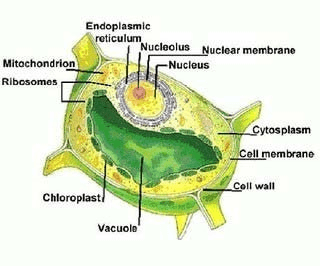These structures are composed of sugar, a phosphate, and have bases which are made up of nucleotides AND makes a nucleotide
What is DNA and/or RNA?
5 levels of organization in a multi-cellular organism
What is cell--> tissue--> organ--> organ system -->organism?
The body's ability to maintain internal conditions
What is homeostasis?
An obligate intracellular parasite. Considered nonliving because it is not made of cells and does not respond to external stimuli or grow
What is a virus?
This organelle is the site of what cellular process
What is photosynthesis?
These two processes is the way in which our cells go from DNA-->mRNA-->Amino acids-->proteins-->cell parts
What is transcription and translation?
Explain how cell specialization is expressed in cell structure
What is the expression of different genes in specialized cells is how structural and functional variations arise in different specialized cells?
i.e. cell structure is based on the role or job the cell performs
Because viruses and different from bacteria, you would not use these to treat a viral infection
What are antibiotics?
This factor in a parasitic symbiotic relationship requires this organism to live in or on another organism which serves as its host. This type of relationship exists between a cell and a virus. The virus is the
What is a parasite?
This energy source is stored in glucose to be released during the process of cellular respiration
What is ATP?
At the end of transcription a set of 3 nitrogenous bases code for a specific amino acid. This base indicator is called
What is a codon?
Body will shut down without this substance because its lubricates joints, keeps our body temperature low, and removes waste
What is water?
When a person has a t cell count lower than 200, they are considered to have this condition
What is AIDS?
Virus is a nonliving organism that does not have a nucleus or other membrane organelles found in eukaryotic cells. Because of these characteristics it is classified as this type of cell
What is a prokaryotic cell?
These are the products of photosynthesis
What are glucose and oxygen?
Name 3 types of RNA and their function
What is
mRNA: carries the message from DNA
tRNA: brings the amino acid to ribosome during translation
rRNA: makes the ribosomes
Plants require these factors in order to grow and develop
What is water, food, sunlight?
When a person which has a weaken immune system, such as one caused by HIV, their immune system may be attacked by this
opportunistic infection; secondary infection
Viruses exists in cycles called lytic or lysogenic, which results in what condition for a normal cell
*Hint "cell lyses"
Death, apoptosis, or cell death
These are required in order for cellular respiration
What are glucose and oxygen?
3 sets of differences between DNA and RNA
Sugar: Deoxyribose and Ribose
Bases: Thymine and Uracil
Structure: Double stranded and single standed
This occurs when there is an incorrect base in the codon after DNA has been translated/transcribed during protein synthesis
What is a mutation?
Examples of these include bacteria, molds, viruses, and chemical agents
What are pathogens?
When a virus enters a host cell, it will insert its genetic material, take control of the cell, and then it will
What is replicate genetic material
All of the following are required for photosynthesis to take place
What are sunlight or solar energy, water, carbon dioxide, and chlorophyll?